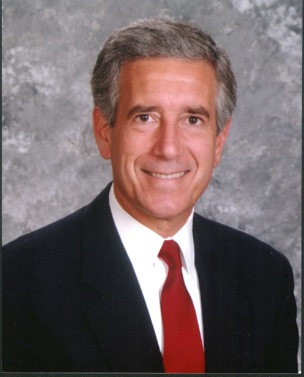The Metropolitan Planning Council’s Change Makers: Modernizing County Government in Illinois interview series addresses challenges faced by county governments throughout the region. DuPage County’s groundbreaking ACT Initiative, Illinois’ first of its kind policy agenda that prioritizes accountability, consolidation and transparency, serves as a model for Illinois communities and we are identifying the unique barriers that diverse localities are encountering in light of new reforms and efficiency measures.

Kane County Chairman Chris Lauzen granted the Metropolitan Planning Council the second interview in this series and spoke about what he perceives as the most prominent hurdles to government reform. Located West of Chicago, Kane County is the fifth most populous county in Illinois and is home to major urban areas such as Elgin and Aurora, which was rated earlier this year as one of the top places to live the American Dream. Lauzen, a Republican, has served as County Chairman since 2012. He also served twenty years in the Illinois State Senate where he was a member of the Appropriations Committee and Revenue Committee. Additionally, he served as Co-Chairman of the bipartisan, bicameral Legislative Audit Commission.
Can you speak to the number of government units in Kane County?
Lauzen said that there are a total of 725 potential taxing districts in Kane County, 220 of which have the authority to implement a tax levy. Additionally, Lauzen noted, there are 425 municipal Special Service Areas, 52 municipal Tax Increment Financing initiatives, 37 county Special Service Areas, and a total of 30 municipalities. Furthermore, Lauzen appoints the boards of between 30 to 45 government entities.
What are issues currently facing Kane County government?
Lauzen recounted that before he took office, Kane experienced a 50% increase in property taxes to fund county operations and constituents were disillusioned with government. “The pressure of property taxes in Illinois is like boiling water shaking the lid off the pot,” said Lauzen. According to Lauzen, the property tax had been increasing over time as previous administrations had considered the increased taxes as added “nickels and dimes,” ultimately delegating the responsibility of holding the line on taxes to someone else. “For working families in urban areas like my hometown of Aurora,” Lauzen said, “those nickels and dimes add up.”
What are barriers to improving this situation?
According to Lauzen, one of the biggest challenges to improving government is the internal control statute which allows county-wide elected officials such as the Sheriff, State’s Attorney, Circuit Clerk, among others, to have absolute control over how they spend the money allotted to their offices as authorized by the county board-authorized budget.
“The pressure of property taxes in Illinois is like boiling water shaking the lid off the pot.”
—Chairman Lauzen
“They [county-wide elected officials] can tell you anything when proposing their budget,” Lauzen said, “but the internal control statute says that until they go over, you can’t tell them to stop spending.” Furthermore, Lauzen explained that the State’s Attorney has the power to interpret the statute and if told by the Board how to manage their budget, a likely response from these independently elected officials would be that the ability of these offices to do their job would be threatened. However, since the interview, Kane County has attempted to move a new financial policy that places limitations on elected officials from spending over their initial budget within the fiscal year; however, that measure was ultimately defeated. Such measures are meant to address what Lauzen described as a “very decentralized form of government” that does not allow for progress on areas like consolidation.
Can you provide examples of how you have seen the internal control statute being taken advantage of?
Lauzen described how the County Coroner had used monies through the internal control statute for expenditures such as $1,000 on silly putty, $5,000 on reflectors to pass out at parades, and dinners at the Golden Nugget in Las Vegas, yet there was nothing the Board could do given the control agencies have under the statute. Additionally, Lauzen recounted an instance before he took office of the County Board’s attempts to hold the Circuit Clerk within her budget. This resulted in the Clerk filing suit against the County Board that eventually cost more than $350,000 in taxpayer-paid legal fees, claiming she could not move forward in her work like this, and instead requested an increased budget.
What efforts has Kane County acted upon to make local government more effective?
Despite these limitations to a more effective government, Lauzen replied that he is a “huge fan” of the impact of DuPage County Chairman Dan Cronin’s ACT Initiative. Following this model, Lauzen explained that cost sharing is a strategy Kane County government has employed to be more effective. An example of
this is the juvenile justice center, which is shared with DuPage County. The facility is housed on Kane’s judicial campus. “We take care of the operations and split the cost,” said Lauzen. This effort has been fiscally beneficial for both counties’ budgets and has proven to be an efficient long-term partnership. Other examples include the consolidation of the Otter Creek Water Reclamation District into South Elgin Water Reclamation District in 2012.
In regards to taxing districts, Lauzen explained the achievement by the Board of maintaining a property tax freeze for five consecutive years and increasing it in the sixth year only for new construction. Lauzen explains that the purpose for this strategy is for the County to live within its means without asking people for more.
Lauzen is approaching a more effective government step-by-step by acknowledging the current barriers and problematic practices, and working to hold county entities more fiscally responsible. Such accountability and capacity-building are among the goals of both the Metropolitan Planning Council’s Effective Government project area and the Transform Illinois coalition.